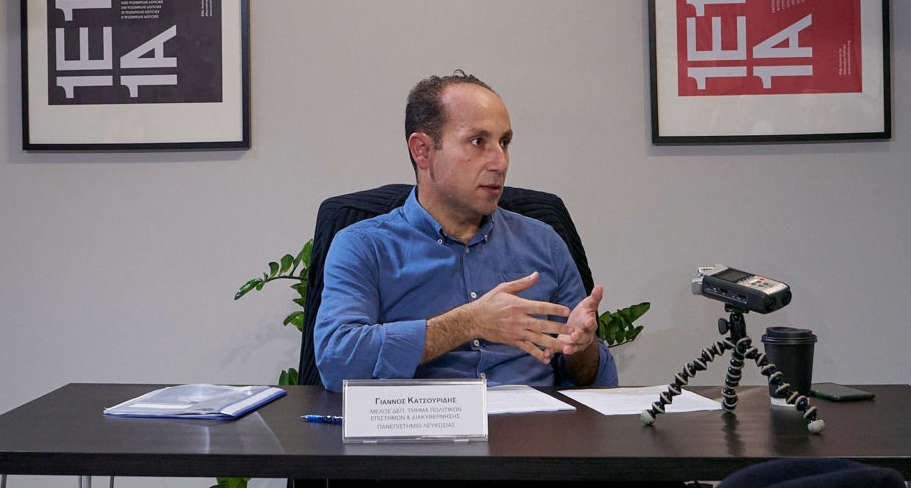

Pavlos Neophytou
Academics from the fields of psychology and political science are presenting an interpretation of recent events in Chloraka. The events involved a protest march by local residents over the migration issue, which took a dramatic turn with incidents of beatings, property destruction, and individual arrests. In their statements to "K," scholars Panagiotis Stavrinidis and Yiannos Katsouridis meticulously outline the precise factors that led to these unprecedented violent scenes in Cyprus. They also elucidate the reasons behind why we should not find these occurrences surprising in the present day. Addressing the observations in the public sphere, the researchers assess the extent to which the Chloraka incidents align with the notion of "pogroms" (organized ethnic violence). Furthermore, they delve into the proposed strategies for addressing the issue at hand.
"We had indications"
"The Chloraka incidents might appear unprecedented to us, but there were indeed indications pointing to the likelihood of such an occurrence. This is particularly true when a considerable number of individuals rally around extremist ideas, as we've recently witnessed, directing blame towards non-local individuals for any adverse events within our society," remarked Panagiotis Stavrinidis, an associate professor in the Department of Psychology at the University of Cyprus. When asked about the potential connection of these specific events to "pogroms," Stavrinidis referred to the term's definition. He emphasized that it signifies a deliberate and violently intense attempt to annihilate people, primarily from different ethnic backgrounds, drawing parallels with the origins of the Nazi Holocaust. Stavrinidis asserted, "Can we label it a 'pogrom' on a smaller scale? Certainly. While thankfully no lives were lost, the events in Chloraka exhibited the attributes of such a vehement assault." 
The state bears a certain responsibility, as the handling of the issue is, at the very least, inadequate. This begins with the premise that these individuals should initially reside in humane conditions, yet we encounter them living in destitution. The matter extends to the assessment of their applications and the eventual integration of lawful beneficiaries who, like any other individuals, live and work here," explained Panagiotis Stavrinidis, an associate professor in the Department of Psychology at the University of Cyprus, during an interview with K.
Regarding the anticipation of this kind of violence occurring in Cyprus, Yiannos Katsouridis, an assistant professor of Political Science at the University of Nicosia, offered a mixed perspective. He stated that it could have been prevented but also recognized that migration was currently a pressing concern in Cypriot society, irrespective of individual coping mechanisms. Katsouridis explained, "Observing Eurobarometer trends over the past 10 to 15 years, we've transitioned from Cypriots deeming this issue 5 to 6 percent important to now being second only to economic conditions at 40 percent. While it's a topic of importance to political entities and parties, the inevitability of its rise has been acknowledged for years. The manifestation might not be surprising given the presence of groups who may cloak their rhetoric, yet online platforms, especially Social Media, provide insight into our trajectory."
He further elucidated, "State institutions have inadvertently facilitated its persistence, leading to inherent problems like ghettoization and a lack of pragmatic solutions. Eradicating immigration is an illusion, but pragmatic strategies should be implemented to manage and mitigate the phenomenon's scope, aiding the integration of legitimate individuals into society. Concurrently, organized factions, particularly on the extreme right, have galvanized anti-immigrant sentiments, orchestrating rallies and rallying cries. Consequently, if the scenes in Chloraka caught anyone off guard, they likely reside outside the Cypriot societal landscape."
"Some people are convinced that anything bad that happens in society is the responsibility of foreigners"
In analyzing the root causes behind the Chloraka incidents, Stavrinidis pointed to a confluence of factors. "Some of our compatriots are convinced that foreigners bear responsibility for any societal misfortunes. This ingrained belief stokes simmering anger. Many individuals have assimilated the notion of their innate superiority over foreigners, fostering a sense of entitlement. This, in turn, breeds frustration, a breeding ground for anger. Concurrently, the current period appears conducive not solely in Cyprus but also throughout Europe, to the proliferation of once-marginalized ideologies, particularly those of the far-right, fascist, and neo-Nazi spectrum. Ultimately, I contend that the state shares some culpability. The management of the issue is conspicuously incomplete, commencing with the principle that these individuals should ideally inhabit humane conditions; yet, they languish in poverty. This disparity continues through the evaluation of their applications, and the endorsement of legal beneficiaries who then assimilate into the workforce akin to any other resident. In cases where this fails to materialize within a favored nation, the seedbed for extremist ideologies takes root," he affirmed.
Self-appointed groups or "militias"
Regarding the characterization of the Chloraka incidents as a "pogrom," Mr. Kataouridis acknowledged that the term might sound somewhat exaggerated, but pragmatically, whether labeled a "pogrom" or otherwise, the occurrence constituted a case of organized and targeted violence against a specific ethnic group, the migrants. "While the protest encompassed a portion of the Chloraka community and neighboring villages, emerging testimonies underscore the cultivated and coordinated nature of the violence, facilitated to a significant extent through online platforms. The presence of hooded individuals wielding clubs was not coincidental. It was evident they arrived with intent, representing an organized effort to assume law enforcement prerogatives. We've witnessed analogous scenarios in Greece with the likes of Golden Dawn—vigilante factions or 'militias' operating within an inflammatory and racially prejudiced framework. Therefore, whether the term appears overwrought to some, the underlying reality remains: structured and targeted violence directed at a particular ethnic group, the immigrants," he supplemented.
"If the images from Chloraka caught anyone off guard, they would likely be out of touch with Cypriot society," conveyed Yiannos Katsouridis, an assistant professor of political science at the University of Nicosia, during an interview with K.
The Significance of Societal Response and Immigration Policy
Contemplating solutions to mitigate or, ideally, eradicate such forms of violence, Stavrinidis emphasized the significance of societal reactions. "Should we become accustomed—without intending to invoke Manos Hatzidakis, as many have done lately, though a kernel of truth exists—to the rhetoric of the far-right and fascist ideologies, gradual acceptance becomes more probable. A perusal of social media reveals the normalization of hate speech and calls for violence, even killings and arson. This normalization is deeply disconcerting. It's imperative to reiterate that humanitarianism doesn't entail promoting chaos; rather, it mandates treating fellow humans as one would expect to be treated. We must reassert that within a society, superior alternatives exist to address problems, urging us not to revert to actions we believed we had outgrown. Additionally, it's essential to remember that during periods of immigration, Hellenism itself endured discrimination, racism, and marginalization. Conceivably, some of the forebears of those presently targeting foreigners encountered comparable prejudices. As a society, we possess the capacity for improvement," he concluded.
On this particular issue, Katsouridis noted the following:
"Migration is a multi-faceted issue, encompassing cultural, political, social, and economic dimensions. It intersects with state institutions, European bodies, and more, and its persistence is certain due to its fundamental origins, which extend beyond the realm of traffickers. The core reasons lie in the circumstances prevailing in migrants' countries of origin—civil conflicts, crises, scarcity, and climate shifts, among others—many of which have historical and contemporary connections to the developed West. Crucially, we must collectively recognize that curbing migration flows isn't a straightforward task. Migration is an age-old phenomenon tracing back to humanity's inception on this planet. Nevertheless, how we manage it demands serious consideration.
"At the European level, the current stance lacks a cohesive policy. Presently, shifting the burden solely onto initial host countries, as observed, merely transfers the load onto a handful of EU nations without proposing viable solutions. This approach compounds the existing problems. Furthermore, feasible strategies exist, as previously highlighted, which entail avoiding the formation of isolated enclaves, presenting practical solutions, and implementing effective integration policies—regrettably not fully realized in Cyprus.
"I hold the belief that governmental bodies mustn't remain passive, exemplified by the recent incidents in Chloraka where greater foresight into the trajectory of the protest march could have been exercised. Our efforts should be focused on, at the very least, alleviating the issue."
[This article was translated from its Greek original]































